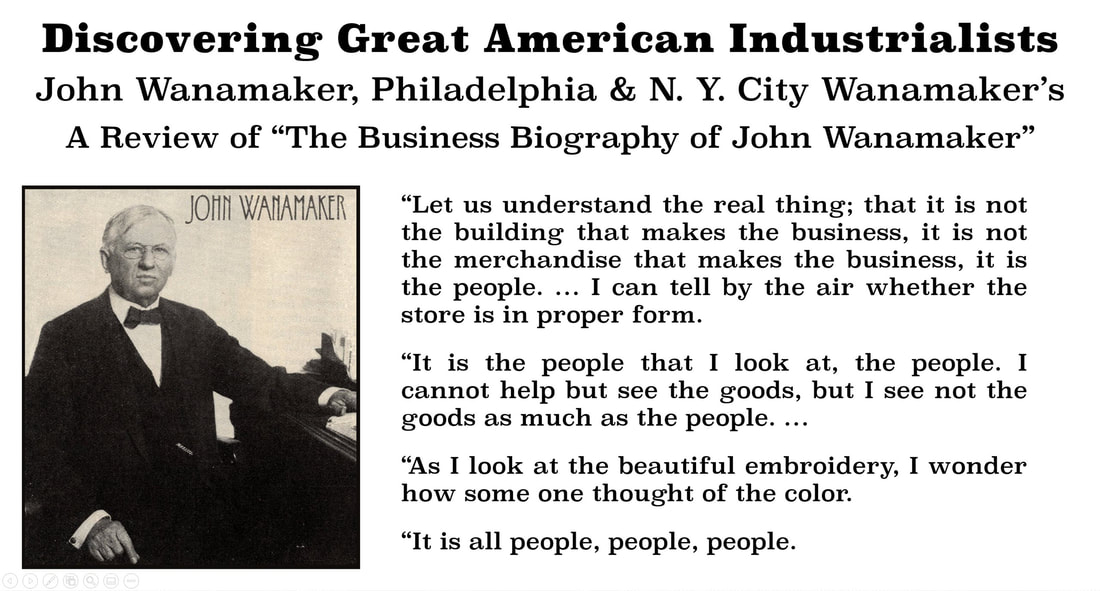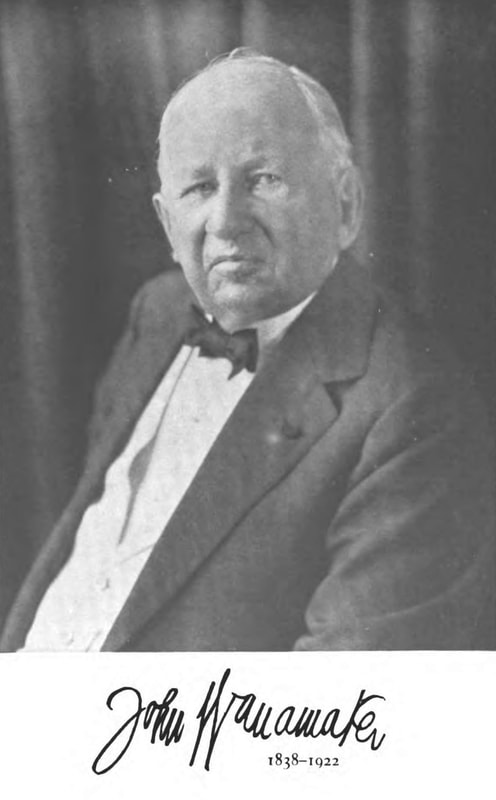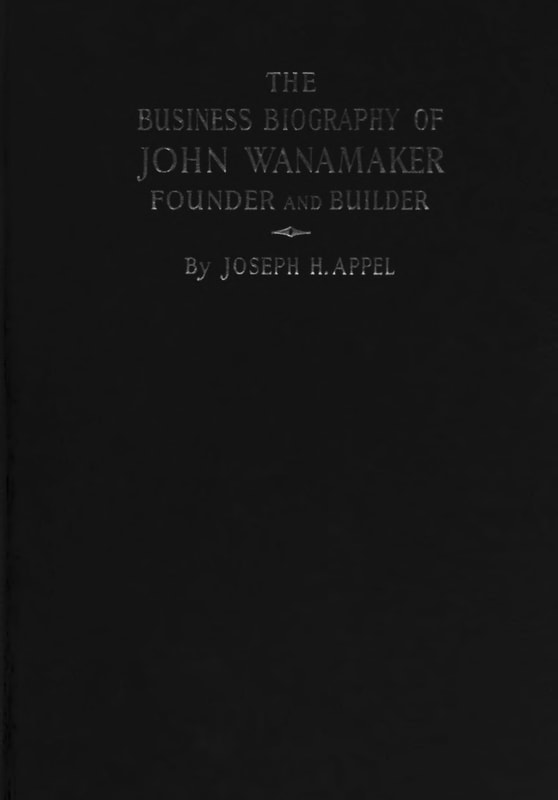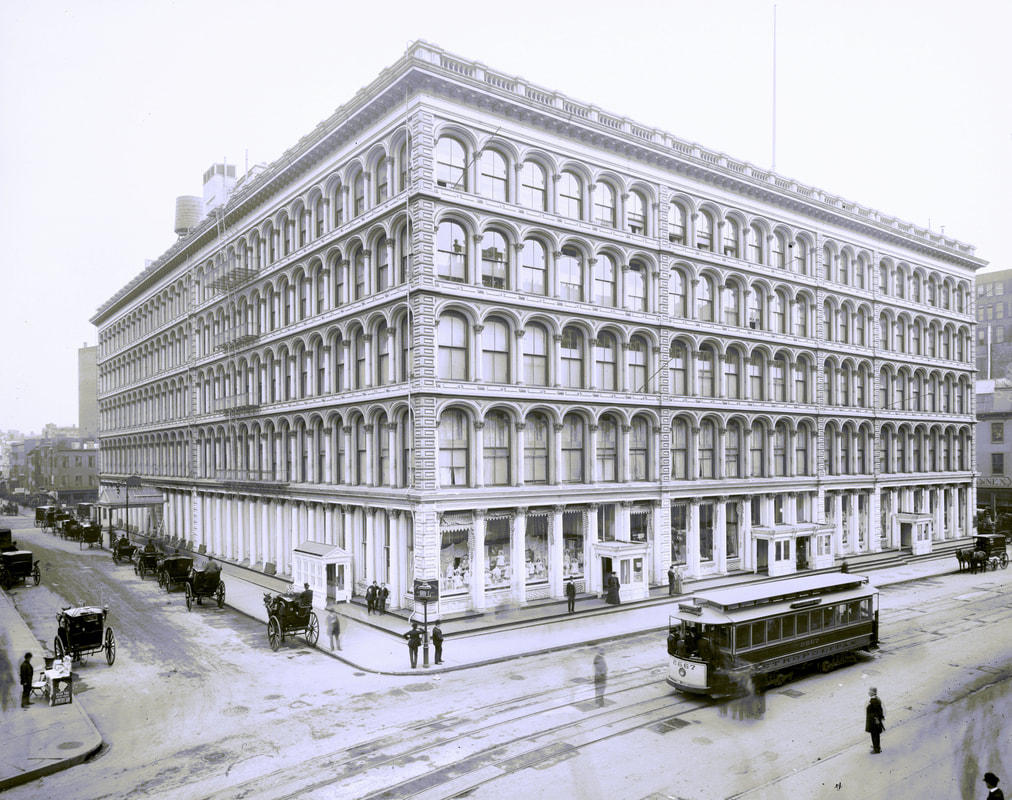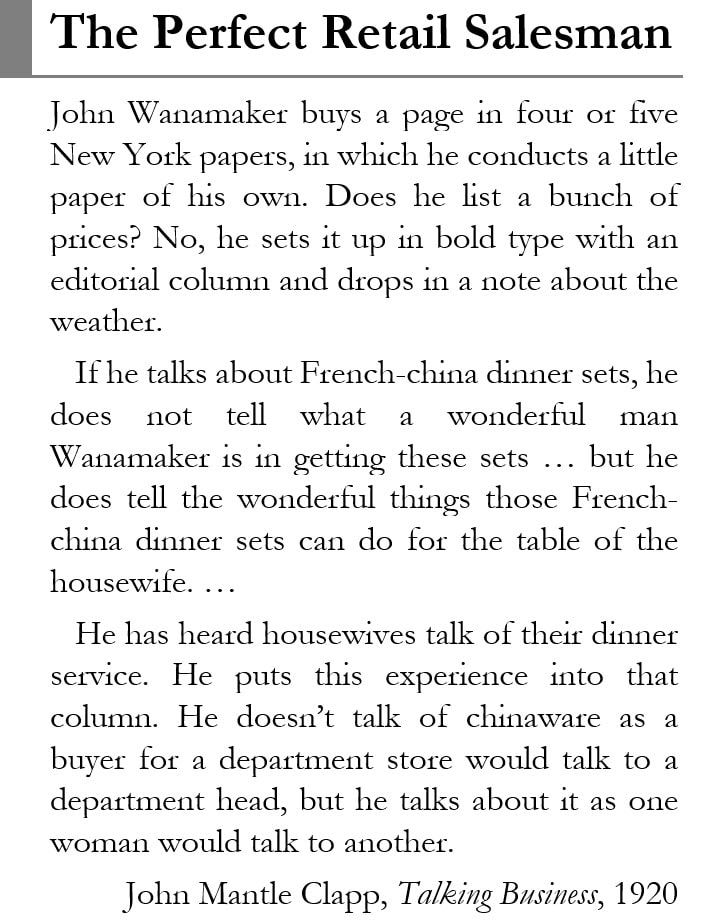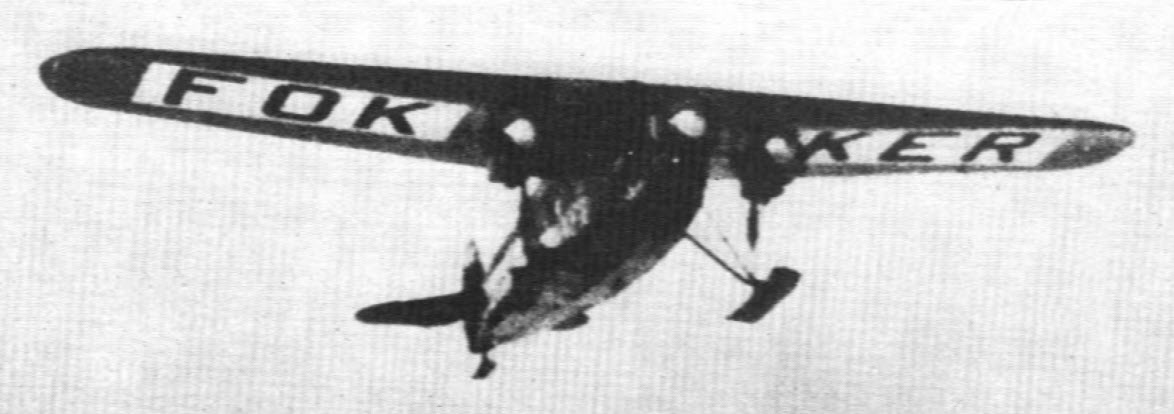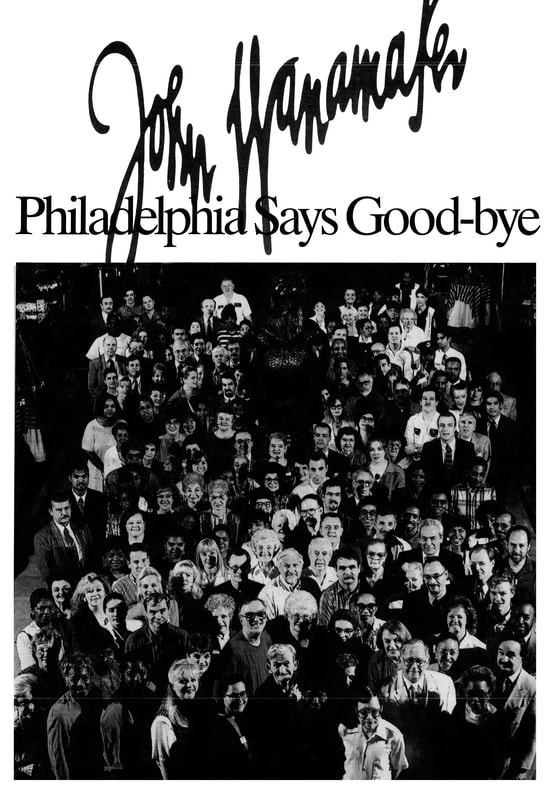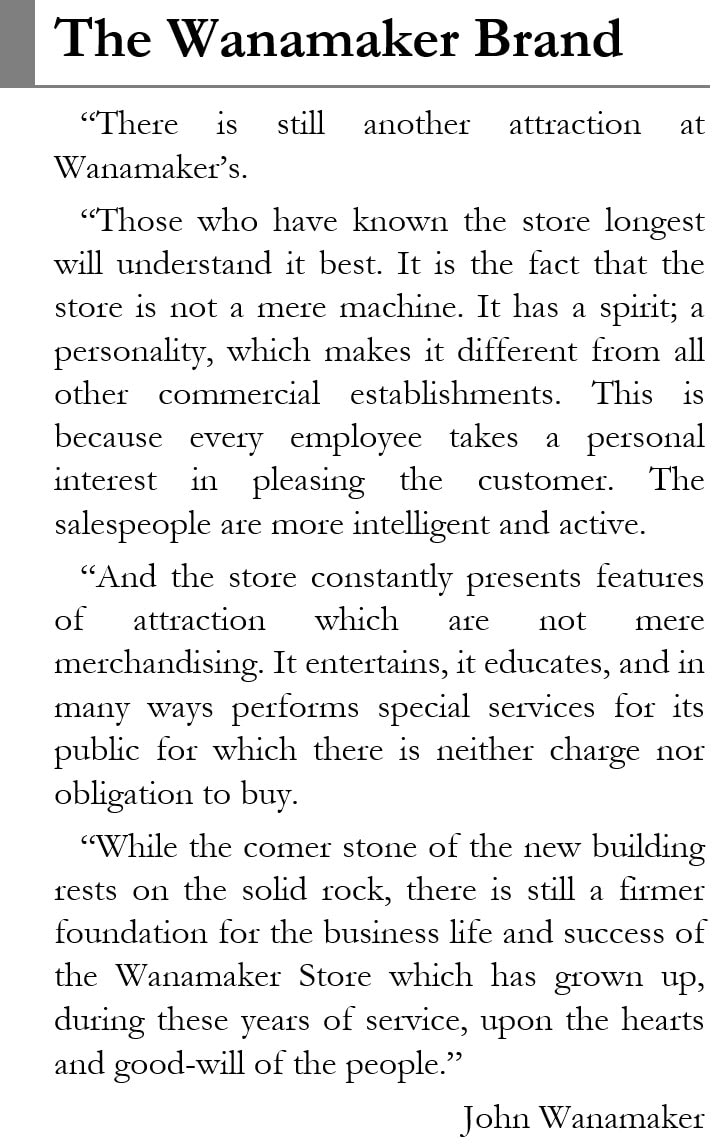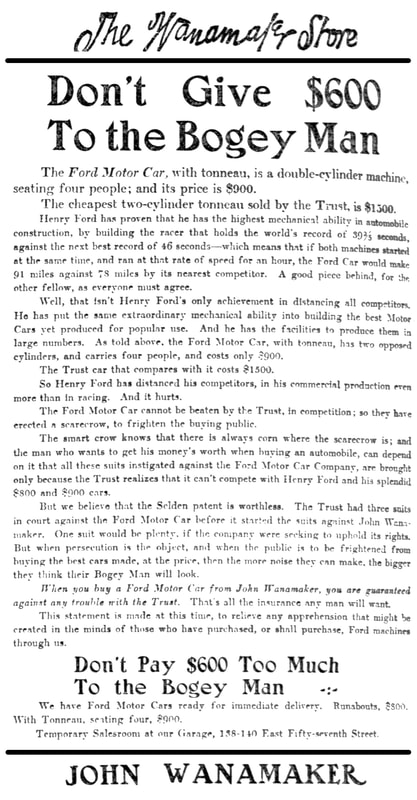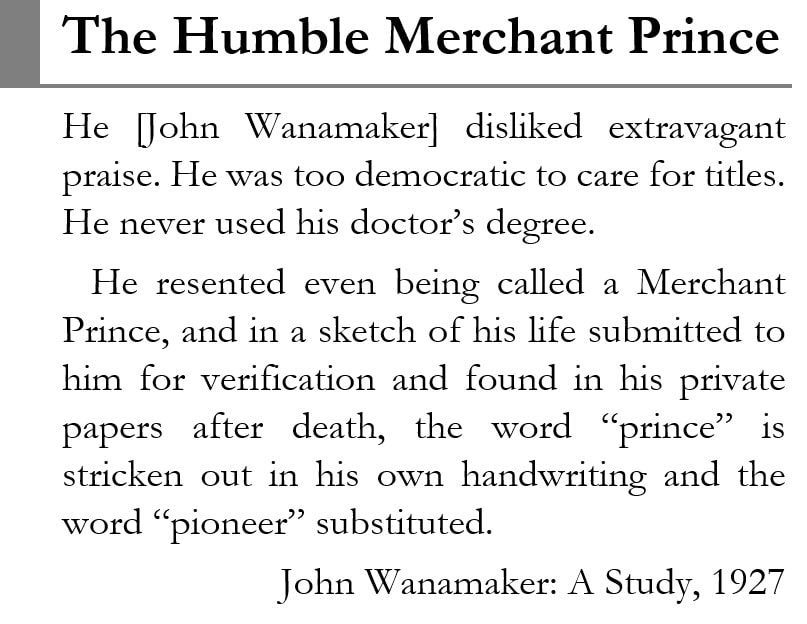A Review of "The Business Biography of John Wanamaker"
|
|
Date Published: June 12, 2020
Date Modified: September 29, 2022 |
Before the founding of JCPenney, Montgomery Ward, or Sears and Roebuck; before Macy’s, Gimbels or Nordstrom became retailing powerhouses; and certainly before Walmart (the youngster but probably best known in this list) there was Wanamaker’s located in Philadelphia and New York City. Founded in 1861 by John Wanamaker many of the “firsts” claimed by the aforementioned companies were actually precedents set by John Wanamaker.
|
In the middle of the 19th Century, when success came to individuals that put money in their pockets, they went to Wanamaker’s to spend it. Herman Hollerith, who provided the “mechanical brains” behind the C-T-R Company in 1911 and International Business Machines in 1924, sent salesclerks “scurrying about” Wanamaker’s when he was finally paid for one of his inventions—the tabulating machine. John Wanamaker was known for his almost poetic writings.
"With many of us the riddle of life is still to be solved. Those who traveled before us along the same roads have left footprints as they struggled, fell down, hoped, despaired or persevered. This ought to be of value to us as we journey … to reach the goal we have in view.
"The biographies, examples and cherished rules that influenced the lives of our fathers are great helps for all of us." John Wanamaker, The Business Biography of John Wanamaker
John Wanamaker left some wonderful "footprints in the sand."
|
A Review of The Business Biography of John Wanamaker by Joseph H. Appel
- Early Reviews of The Business Biography of John Wanamaker
- The Public Clamors for the Story of one of America’s Merchant Princes
- Background on John Wanamaker: A Humble Merchant Prince
- A Gift for "Promotions," “Firsts” and “Promotional Firsts.”
- This Author’s Perspective
Reviews of the Day: 1930
|
“During his career as a master merchant, John Wanamaker was responsible for the advance of store advertising in newspapers and magazines, doing away with barter and haggling, [providing] one price to all at one time, a money back guarantee, low cash basis, improved conditions for the stores’ employees, linking executives of stores with philanthropic and civic developments, and a number of other improvements that have completely revolutionized the retail trade.”
The Brooklyn Daily Eagle, February 9, 1930
“Mr. Joseph H. Appel [the author] has been connected with the great business of which he writes for thirty years and enjoyed the intimacy of the founder and his sons. There is probably no one that could write of Mr. Wanamaker with more authority and fervor … it gives us a most complete story of an eventful life, even telling of the cynics who sneeringly referred to Mr. Wanamaker as “Honest John” or “Pious John.”
The Philadelphia Inquirer, February 15, 1930
|
The Public Clamors for the Story of one of America’s Merchant Princes
This biography about one of America’s most well-known, nineteenth-century merchants sold out in its first week. The publisher, MacMillan Company, announced a second printing and apologized for the lack of copies writing that “a second printing is now on the press.” More reviews followed the ones above:
”Draws on the writings of Mr. Wanamaker … book is not only biographical, but also autobiographical.”
The New York Times
|
“History of a great American business institution … personal and human observations.”
The New York Sun
“May well become the biography of the year, as it is, to our knowledge, the only book ever chosen by two separate book clubs as their book of the month.”
Business Libraries, Inc.
“The book is the biography of a merchant price who recognized that the finest attribute of princes is humility.”
N. Y. World Syndicate
|
Background on John Wanamaker: A Humble Merchant Prince
|
Wanamaker's New York City
|
With the late Marshall Field, John Wanamaker is often credited for the establishment of the modern-day department store. The only other man many considered his equivalent was A. T. Stewart who, Mr. Wanamaker considered the ideal merchant. John Wanamaker purchased his icon’s establishment (A. T. Stewart’s of New York) after the founder’s death which he then converted into Wanamaker’s, New York.
John Wanamaker was born in Philadelphia in 1838. He said of his mid-1800’s lack of education, “Whatever education I have received, has been picked up as I went along just as a locomotive scoops up water without stopping.” He began work as an errand boy in a bookstore at the age of fourteen. |
|
Then he eventually became a retail-clothing salesman and established the clothing house of Wanamaker & Brown. Out of this clothing establishment, he added one department after another until he grew the business into the enormous Philadelphia store called Wanamaker’s.
He was a pioneer in department store advertising (see sidebar). He was the first to take out full-page, daily advertising space which he branded with distinctive types and styles. He founded the John Wanamaker Commercial Institute. An organization that recognized the clear duty of the store to educate its young men and boys, and women and girls. He believed there was “a social service” due “from employer to employee.” He gave large sums to charity, personally sending two relief ships during World War I to Belgium which were stocked with supplies from Philadelphia’s citizens. He was an officer of the French Legion of Honor. |
It was the Wanamaker’s Store, New York that became the center of worldwide attention as the Titanic sent out its tragic distress signal: “WE’VE STRUCK AN ICEBERG, SINKING FAST.” President Taft ordered all other radio stations off the air leaving a young man named David Sarnoff sitting in Wanamaker’s New York store broadcasting every detail about the unfolding tragedy.
For 72 straight hours, until the last survivor was named, David Sarnoff, future president and chairman of the board of Radio Corporation of America (RCA), future chairman of the board of National Broadcasting Co. (NBC), and eventually named the “Father of American Television”—and the New York Wanamaker’s store—were the center of the universe for the people of the world.
For 72 straight hours, until the last survivor was named, David Sarnoff, future president and chairman of the board of Radio Corporation of America (RCA), future chairman of the board of National Broadcasting Co. (NBC), and eventually named the “Father of American Television”—and the New York Wanamaker’s store—were the center of the universe for the people of the world.
A Gift for "Promotions,“ Firsts" and “Promotional Firsts.”
|
Read about Wanamaker "firsts"
|
John Wanamaker like many of his peers and those that followed him had a belief in running business to a set standard, a golden standard. He stated, “The Golden Rule of the New Testament has become the Golden Rule of business.”
Because of this he was often referred to in a cynical way as “Pious John” and “Honest John.” The list of firsts for John Wanamaker and his sons is a lengthy one (Select the balloon image to see the complete list). In many of these firsts, the application of the Golden Rule can be seen. Other firsts are the forward movement of a great business enterprise constantly attempting new projects to be of service to its customers. |
When it came to promotional firsts, Wanamaker’s was almost always out in front: wireless phone communication between the Philadelphia and New York stores, the first airplane sold by a retail merchant, guaranteeing money back on Ford automobiles during the early automobile patent fights, launching a balloon from the New York Wanamaker’s to Philadelphia’s Wanamaker’s, and displaying the fully assembled and functional “Viking of the North” on the main floor of both stores—the plane which Byrd and Bennett flew on their epic journey to the North Pole (shown below).
Fokker was fully assembled and visible to the public at both Wanamaker stores
This Author’s Perspective
When Wanamaker’s Philadelphia came to an end, its employees and those who had shopped within its walls took the opportunity to say, “Goodbye.” They knew that a good thing had come to an end. To them the store was always about family and they were losing it. Having worked for a corporation that, unlike Wanamaker’s, still exists in name but has also lost its sense of family … I understand.
It was a real pleasure to read a book about a man who did not shy away from his Christian heritage. Our forefathers came to our shores because of religious persecution … but did not shy away from their Christian heritage. As a country, we are accepting of other religions and mandate separation of church and state in a large part because of the Golden Rule.
John Wanamaker ran his life and business according to this glistening guide that should help direct all of our human behavior.
It was a real pleasure to read a book about a man who did not shy away from his Christian heritage. Our forefathers came to our shores because of religious persecution … but did not shy away from their Christian heritage. As a country, we are accepting of other religions and mandate separation of church and state in a large part because of the Golden Rule.
John Wanamaker ran his life and business according to this glistening guide that should help direct all of our human behavior.
Fact Checking The Business Biography of John Wanamaker
|
I like to confirm what is in early biographies if at all possible—especially ones that are as overwhelmingly positive as this one. In the case of John Wanamaker, this was possible through one of the well-known muckrakers of McClure’s Magazine: Lincoln Steffens. In an expose on the corrupt political machine running the city, he wrote an expose entitled “Philadelphia – Corrupt and Content.”
The muckraker writes of the “political machine” attempting to bribe and blackmail an upstanding citizen of the city (John Wanamaker) to get his son to quit writing embarrassing articles about the machine. In several instances, John Wanamaker went out of his way to embarrass the city officials for their brazen, corrupt politics. Lincoln Steffens wrote of the city in 1903: |
"Philadelphia is representative. … All our municipal governments are more or less bad and all our people are optimists. Philadelphia is simply the most corrupt and the most contented. Minneapolis has cleaned up. Pittsburg has tried to, New York fights every other election, Chicago fights all the time. Even St. Louis has begun to stir and at the worst was only shameless. … Philadelphia is proud; good people there defend corruption and boast of their machine. … one man, who, driven to bay with his local pride, says: “At least you must admit that our machine is the best you have ever seen. …
"Disgraceful? Other cities say so. But I say that if Philadelphia is a disgrace, it is a disgrace not to itself alone, nor to Pennsylvania, but to the United States and to American character."
"Disgraceful? Other cities say so. But I say that if Philadelphia is a disgrace, it is a disgrace not to itself alone, nor to Pennsylvania, but to the United States and to American character."
|
Pretty damning … but John Wanamaker, evidently, tried to stand above it all, and his store was a success because it operated under a different set of rules … because even those who treat others unjustly still want to deal with organizations that treat them fairly.
He wrote of how he ran his business: This store stands upon principles. Its sole foundation is its principles, not its practices nor its profits. This is the inside of our heart—to stand on our integrity, on principle, on honor, on justice, not only for the store but for our customers and for each other. A Man of Change and Action He was always monitoring change in other industries that would affect his. For instance, the coming of the automobile. At the time, he had one of the best harness- and horse-goods stores in the country. Yet, if the horse and buggy were to give way to the automobile, it was his job as a merchant to lead the transition and replace out-of-date merchandise with new. |
So he stocked the Studebaker and the Rambler among gasoline cars, and, among steam cars, the Foster. But he was only partially sold on the idea. He wondered how he could keep his “guaranteed satisfaction” bond with customers—mechanically most of these cars still had a long way to go.
|
Then, in 1903 Henry Ford produced a car that was of a quality and at a price ($600 - $900) that John Wanamaker could believe in and sell with all his passion. He took over the Ford Agencies in Philadelphia and New York and personally guaranteed anyone who purchased a car in his store against loss if Ford should lose the Selden Patent Suit against the “Trust.”
At the time, John Wanamaker was the known man. Henry Ford was still looking to make his name. Wanamaker put his stamp of approval on the man and the car, and the rest is history. The patent suit died. Letting the man speak for himself As usual in my reviews, I like to allow the subject of the review—John Wanamaker in this case—to speak for himself or herself. First, two exchanges between employer and employee during the Golden Jubilee Celebration of Wanamaker's in 1911. Then a few business philosophies written by John Wanamaker. |
- The employees speak of their employer
"You have done more than merely supply human needs. You have gone into the homes of the people. You have looked into their minds, their hearts, into their relations with one another. You have raised their standard of living by supplying them with new comforts and conveniences, by bringing art and culture into their lives, giving them a new outlook, surrounding them with a new environment. And we change men by changing their environment."
Spokesman for Wanamaker Store Employees, Golden Jubilee Celebration, 1911
- The employer speaks of his employee
"There is something else in business than the mere contract that binds us in each other’s service. … It has been the common practice for many years—and still is in many cities—simply to live by a bond that is written in black and white. Our bond is quite a different one: it is written in the whiteness of honor and in the redness of the fervent love in every one of our hearts. This is the tie that binds, and it is stronger than any other bond that could possibly be written."
John Wanamaker to his employees, Golden Jubilee Celebration, 1911
- The philosophies of John Wanamaker
"No bargain is worth having unless it satisfies both ends of the bargain and leaves both with a profit."
John Wanamaker
|
"As I grow older it becomes clearer to me that the difference between men who accomplish things and those who fail to accomplish things is in correct thinking, energy and invincible determination. A single aim and a strong spirit, undistracted and untiring, seldom fall short of the goal.
"Work is the master key to all the doors and opportunities. The man who never quits until the work is done inevitably writes his name on the roll of winners." John Wanamaker
|
"Let us understand the real thing; that it is not the building that makes the business, it is not the merchandise that makes the business, it is the people. I astonished someone last week, as I said: “When I go downstairs and look around, I look very little at the merchandise. I can tell by the air whether the store is in proper form. It is the people that I look at, the people. I cannot help but see the goods, but I see not the goods as much as the people.”
"I wonder, as I look at the beautiful embroidery, I wonder how some one thought of the color.
"It is all people, people, people."
"I wonder, as I look at the beautiful embroidery, I wonder how some one thought of the color.
"It is all people, people, people."
John Wanamaker
It is on the thought in this last sentence, that I will leave this book review.
It seems appropriate.
Cheers,
- Pete
It seems appropriate.
Cheers,
- Pete
